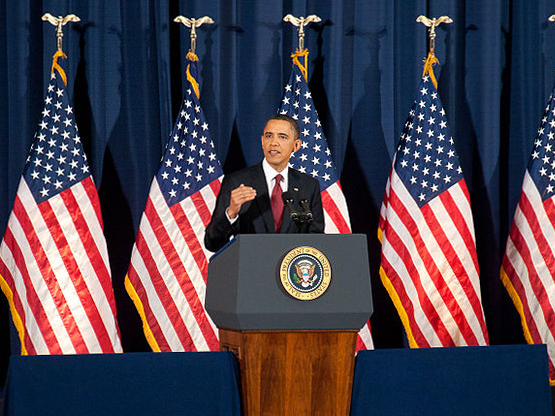

| Visitors Now: | |
| Total Visits: | |
| Total Stories: |

| Story Views | |
| Now: | |
| Last Hour: | |
| Last 24 Hours: | |
| Total: | |
The Elusive Obama Doctrine
Leslie H. Gelb
August 22, 2012
 LEAVING ASIDE political and ideological malcontents as well as defenders of the faith, it seems to me that three points can be made fairly regarding President Barack Obama’s foreign-policy and national-security record.
LEAVING ASIDE political and ideological malcontents as well as defenders of the faith, it seems to me that three points can be made fairly regarding President Barack Obama’s foreign-policy and national-security record.
First, he has captured the potent political center, a considerable feat for any Democrat. He’s done so mainly by staying out of big, costly trouble. He further helped himself by co-opting some of the popular hard-nosed rhetoric and actions of traditional realists not generally associated with Democrats. Right-wing extremists did their part by practically conceding the middle ground with their unrelenting hawkishness. All of this permitted Obama to outmaneuver the Republicans and hold the center. In doing so, he has given Democrats their first real shot at being America’s leading party on foreign policy since Franklin Roosevelt and the earliest days of Harry Truman.
This has been nothing short of a political coup that could reverse long-standing Republican electoral advantages on national security.
Second, Obama managed a complex range of tactical challenges quite well, improving significantly on the international position he inherited from George W. Bush and generally bolstering America’s reputation. Specifically, he managed America’s exit from Iraq well and developed a new, focused and effective military strategy to counter terrorists. Inevitably, experts will quarrel over whether Obama could have done more of this or less of that. But on the whole, he guided America capably through the kinds of problems that often had turned sour in administrations past. Even where Obama took wrong turns—and there were a number of these—he mostly sidestepped costly mistakes, with the exception of Afghanistan. He was aided in avoiding such big errors—quite an accomplishment—by possessing a clear sense of the limitations of American power.
Third, while Obama saw what American power could not do, he failed to appreciate what American power could do, especially when encased in good strategy. Thus, his principal shortcoming was failing to formulate strategy and understand its interplay with power. He should be faulted here, even though most who fault him usually fail to produce their own viable strategies—those magical brews of picturing pitfalls and opportunities, hammering out attainable objectives and focusing the use of power. To this day, Obama’s Afghanistan strategy seems little more than a disjointed list of tactics. More sorrowfully on the strategic front, he has yet to put economic resurgence and U.S. economic power at the core of the national-security debate, where they must be, for an effective national-security policy in the twenty-first century. To be sure, he has spoken of this need on occasion, but in his hands it has seemed more a rhetorical stepchild than a key ingredient of international power and successful strategy. Without strategy and without economic renewal to power it, Obama neither has achieved lasting strategic breakthroughs nor laid the groundwork for them later on.
Those who have easy solutions for foreign-policy challenges don’t know very much about foreign policy. I’ve tried to be mindful of the great difficulties and of reasonably varied policy perspectives—and of the fact that, in the course of events, I’ve changed my own mind on matters small and large. I am mindful, too, that strange occurrences often attend the months preceding presidential elections.


